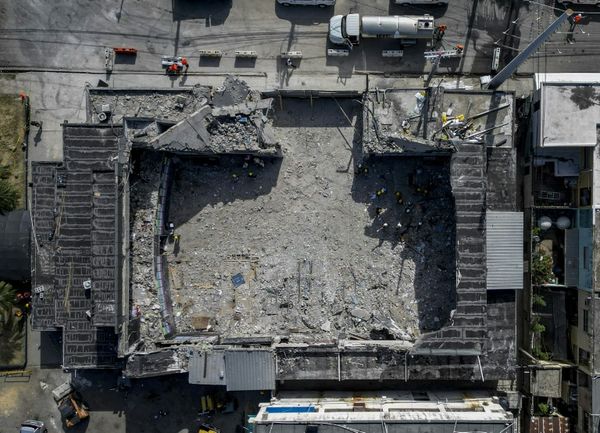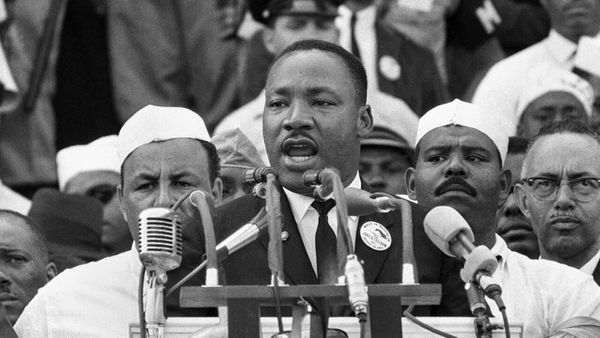
Back in the southern hemisphere it is easy to imagine Eddie Jones leaning back in his chair and smiling wryly. We will never know exactly what England squad the previous head coach would have chosen but he will definitely recognise the theme running through it. Let’s just say those hoping Jones’s exit would release a fizzing new sense of red-rose adventure with an enticing top note of “Bazball” are still waiting for the cork to burst from the bottle.
England’s 33-man Rugby World Cup party for France is certainly not one to encourage much champagne-fuelled excitement among connoisseurs of expansive, enterprising rugby. If last Saturday in Cardiff is any guide, England appear primarily intent on hoofing it high, chasing hard, relying on their set piece and kicking their goals. Nothing wrong with that if it is all you’ve got. But it is not a formula that, on its own, will win a modern World Cup against top-level opposition.
The most obvious conclusion is that Steve Borthwick, in charge only since December, feels he has had insufficient time to concentrate on much beyond the absolute basics. Henry Slade’s omission, in that context, becomes less of a shock. What’s the point in picking D’Artagnan and his supporting musketeers if the job largely entails chasing kicks and tackling onrushing road trains? In fairness, though, Joe Marchant is a brilliant aerial operator and should probably have had more recognition than the 16 caps he has won to date.
Judging by Saturday night in Cardiff, Slade might just consider himself well out of it. Even allowing for the changing shape of the modern game, England were static, unambitious and dull in every sense of the word. Notwithstanding Wales’s feisty performance, it was not much of an advertisement for English imagination. While there is still a month left in which to restore some faith, the rest of the world is not exactly quaking.
Peek beyond the Twickenham sunshine and the natural joy of those selected and the squad contains just one specialist No 8, who hasn’t played since April, a semi-fit hooker, 10 players from the starting XV involved in the Cardiff debacle, a couple of ageing scrum-halves and some very underwhelming recent form. England have lost their last three games, scoring just two tries and conceding 13. Unless they show signs of reversing that trend in the next three weeks, their opening pool match against Argentina in Marseille will become ever more problematic.
Borthwick’s counterview is that his side can still play in more than one way, with the 20-year-old Henry Arundell on hand to supply a surge of electricity. Had they been slightly bolder, though, the squad could have looked very different: the dash of Harry Randall and Raffi Quirke at scrum-half, Slade offering elegance and a cultured left boot at 13, the X-factor of Adam Radwan on the wing and the speedy Arundell given the chance to roam from full-back. They could have picked Zach Mercer, the Top 14’s player of the year last year, or the dynamic Sam Simmonds. They could have taken a punt on Val Rapava-Ruskin at loosehead or Tom Pearson in the back row. Instead, in almost every case, they have preferred to play the percentages.

No one is suggesting entertainment is more important than outcome but the two do not have to be mutually exclusive. It would certainly be an appalling waste of talent if Slade, now 30, never plays for England again. Or is forced to head overseas to find true fulfilment. The late, great David Duckham, when we met last year, told me Slade was the player he enjoyed watching most among the modern global generation. “He’s got style,” the former England and Lions three-quarter said. “I think of him as the Roger Federer of rugby.” Graceful English centres, sadly, seem to be going the same way as wooden tennis rackets and barley water.
The game is forever moving on, of course, but surely autoroute rugby alone will not win England this World Cup? Up front they have not frightened anybody for some time. Borthwick, as did Jones before him, keeps citing English forward strength as the traditional foundation for all else. But it is 20 years since England won a World Cup and the “white orcs on steroids” are now mostly an endangered species. The old line from Crocodile Dundee – “That’s not a knife …” – may yet apply as and when they encounter bigger, stronger set pieces.
It is also a squad picked from a narrow geographical base. Playing for Saracens, Leicester, Sale, Harlequins or Northampton at some stage in your career seems to have been helpful. There are more French-based players involved than there are players from Bath, Exeter, Gloucester and Newcastle combined and all three of Bristol’s representatives – Ellis Genge, Max Malins and Kyle Sinckler – have also been vital cogs for Tigers, Sarries and Quins in the not-too-distant past.
At least there is some decent experience, with 16 squad survivors from 2019. Twelve of the starting XV who defeated the All Blacks in the Yokohama semi-final are back for more. Defence should be a strength and England have an encouraging draw that offers a great chance of making the semi-finals. Somewhere along the line, though, it will also be important to lift supporters out of their seats and generate some feelgood vibes. England’s chosen ones have been selected with a specific game plan in mind in France but it may not be easy on the eye.

This is an extract from our weekly rugby union email, the Breakdown. To subscribe, just visit this page and follow the instructions.







